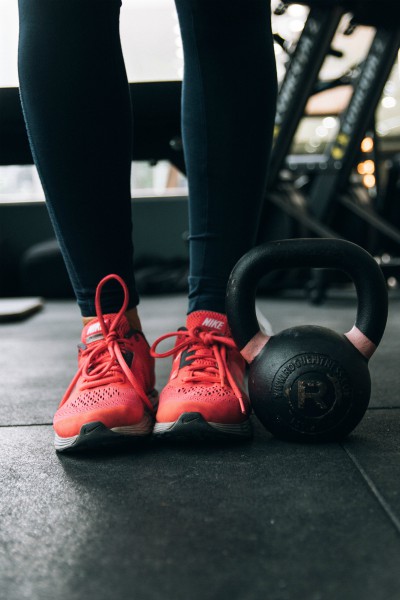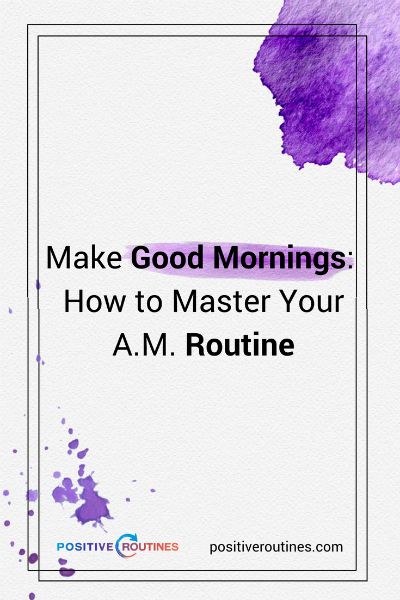What’s one surprising key to actually having good mornings? Routine. It might seem boring, but an effective morning routine can be incredibly important to developing successful, productive, even (shocker) enjoyable days and weeks. Unfortunately, many of us seem not to maximize our mornings.
It’s only logical: If you have children (or dogs), or generally “aren’t a morning person,” your routine is a pre-dawn rush to achieve the basics. By the time you hit the office, there are emails to deal with. Then meetings. Then more of both. Repeat until suddenly it’s Friday, and you have no idea where your week went. Sound familiar?
Master Good Mornings to Master Good Days

But a successful routine is a benchmark for good mornings, explains Claire Diaz-Ortiz, a productivity expert and the author of Design Your Day. Why? Because how you start your day anchors you and ensures you stay focused on what’s most important. According to Diaz-Ortiz, if you want to achieve your highest level of productivity, you have to master a consistent morning routine.
Okay, we get it. But how exactly do you become a master of good mornings, especially if your typical sunrise routine is more chaotic than calming?
Hack Your Routine with Better Habits

Ah yes. Remember habits? There’s a ton of research on habit formation, and some of it even ventures outside of academia. Here are two ways to think about it:
- Charles Duhigg, author of The Power of Habit, explains habit formation as a three-step process:
- Cue: something that triggers you to act
- Routine: series of actions following the trigger
- Reward: self-explanatory
- Want more on this process? Watch Duhigg’s TEDx Talk on the habit loop.
- Here’s Gretchen Rubin, author of The Happiness Project and Better than Before: Mastering the Habits of Our Everyday Lives, on habits:
…when we change our habits, we change our lives. We can use decision-making to choose the habits we want to form, use willpower to get the habit started, then—and this is the best part—we can allow the extraordinary power of habit to take over. At that point, we’re free from the need to decide and the need to use willpower.”
Habit formation is important because it somewhat automates your life or elements of your life. If you can set-up habits around the things you want to achieve early in the day, like prioritizing your workload or avoiding the email black hole, you can have the good mornings you’ve always wanted. And it’ll be automated, so you don’t need willpower to make it happen. Even better.
So what are some habits that can make (or break) your morning routine?
3 Ways to Maximize Your Morning Routine
Here are some small science-backed strategies to consider as you adjust the course of your morning:
1. Good mornings = No work email

Email, while great for connectivity, largely stresses us out. And most of us are guilty of email-checking long before we’re actually on the clock. According to a 2015 Reuters survey, about 80 percent of us take a look at our work inboxes before we hit the office and 30 percent of us are checking them before we get out of bed. Yikes.
If your regular routine involves checking email, you might want to rethink your strategy. Why? You fall into a vortex of reacting and responding, which increases stress and reduces your sense of control of your day. You’re still in bed, and you’re already playing catch-up. Translation: Your goals are taking a backseat.
Try this instead: We already know that your environment plays a big role in creating your habits, so use that knowledge to form a new, email-free morning routine.
- Use a real alarm clock to reduce the temptation to check-in from under the covers.
- Keep your phone out of sight until you leave for work.
- Disconnect your work email from your phone, tablet, or personal computer. (You won’t suddenly become a terrible employee, promise.) or at least…
- Disable email notifications on your devices.
2. Make those 15 minutes matter

This is all of us: “At most I have 15 minutes in the morning I can use.” Think that’s not enough time for a morning routine? Think again. You can get a lot done in those 15 minutes. The trick is to plan for them. And be specific about those plans.
Try it like this:
- Make a plan the night before of three to five items max.
- Write the items in an actionable, verb-driven way. (E.g., “Light stretching for three minutes, then three minutes of kettlebell swings.”)
- Tweak your environment to make it easier: Put your shoes by the bed and the kettlebell in a visible spot, egging you on.
- Wake up and execute your plan.
- Optional but recommended: Feel like a badass.
Action words and specifics can lead to greater success with task accomplishment, according to research, so you can make those 15 minutes matter. And make good mornings more likely.
3. Track your daily wins…and losses

Here’s a technique that can shape your morning routine over time: At the end of each day:
- Write down three positive elements of that day.
- Use a ton of detail.
- Include how you felt about them and why they might have happened.
- Jot down one constructive, could-be-improved-upon element in a similar way.*
But wait a second, that’s at the end of the day. What does that have to do with making good mornings? We’re getting there.
At the end of the week, you’ll have 21 positives and 7 things to improve on. And that’s powerful stuff. Here’s how to use it to make mornings that matter:
- Look at your positive and to-improve lists each week or every other week.
- See patterns of what you do well and what you could improve.
- Focus your morning routine on the day-to-day stuff you need to work on.
For example, if you notice your to-do-betters are about leaving the office on time, consider using your morning routine to prioritize your day. Think about what must get done before you leave work, and block out time to get those things done. (And this strategy works. Cal Newport, author of Deep Work, breaks down time-blocking in this blog post.) Now you’re solving problems, giving yourself props for your small successes, and using your morning routine for good, not evil, all because you used data (about yourself) to inform decision-making.
*Disclaimer: This is similar to the three-to-one ratio in positive psychology that’s been largely disproven as a way to increase happiness. However, we’re talking small-scale strategies for tracking behavior and using that to guide your good mornings. It works as a data-gathering strategy, not necessarily as a happiness guarantee. We good?
Get good at good mornings
The importance of a morning routine is that it gets your day started properly, with less stress, more automation, and a quick win of “I did that successfully again.” It’s easier than you think…and better than drowsily responding to trillions of emails all marked “urgent.” Give your A.M. routine a little makeover and see how many good mornings you can rack up. You might be surprised.
Your turn: What’s priority number one in your morning routine? How does it make for good mornings? Tell us in the comments.
If you like this article you’ll also like 7 Successful Women Share: My Best Morning Routine


 Michelle says
Michelle says
December 13, 2017 at 11:10 amPriorities is one area that I struggle with. General priorities are easy: God, family, health. But realistic, put it down on paper priorities is much harder. So, what are morning priorities? ideas?
 Chelsey says
Chelsey says
December 14, 2017 at 7:57 amThanks for the comment, Michelle! Setting priorities can be tough, but it seems like you already know your top three. It might help to think about your daily priorities as serving your general ones. So what can you do in the mornings that prioritize health, your family, and your religion? Perhaps you can fit in a 15-minute workout or set aside time for prayer and quiet reflection. If your daily morning priorities are in line with your general ones, you should be moving in a good direction.
You can also check out our article on productivity tools. The first tool talks about how to recognize the difference between urgent and important work and prioritize your day around the important tasks. It might help you determine your own morning priorities.
https://positiveroutines.com/how-to-be-more-productive-tools/
Hope that helps!
 Matt says
Matt says
January 30, 2018 at 8:05 pmThis article helped me a lot. I was struggling to figure out if my morning routine was working, but like you said if it is aligned with my most general properties I should be alright!
 Chelsey says
Chelsey says
January 31, 2018 at 3:20 pmThanks, Matt. You’re already ahead of the curve by having a morning routine to begin with. Keep revisiting your routine to make sure it’s working for you, and if you find that it isn’t, try some of the strategies in the article to find a better fit.
 Jean Gray says
Jean Gray says
March 24, 2018 at 9:10 pmG.O.S.P.E.L GOD, Others, Self Physical, Emotional, Logical. Honoring GOD first these basic components of life need regular attention to maintain balance. Sideline one and experience more stress…
 Chelsey says
Chelsey says
March 26, 2018 at 11:03 amThank you for your comment, Jean! We’re so happy you found something that works for you.
 Valerie says
Valerie says
April 13, 2018 at 8:30 amI have been struggling to find some kind of purpose to my life. At 65, semi-retired, I no longer have big goals to strive for. I work when I feel like it, have mostly sufficient funds for my needs, adore my daughter and grandchildren but they are quite self-sufficient, etc., etc…. I agree with others that being of service to God/humanity is key. To be of service I need to be healthy. To be healthy I need to be disciplined to do those things that make me healthy in every way–physically, emotionally, financially. But I feel stressed looking at my daily planner, trying to figure out how to incorporate those principles in a meaningful way. How do I express those goals, those principles in a way where I can see how I am moving forward, where I could improve?
 Chelsey says
Chelsey says
April 17, 2018 at 10:08 amThank you so much for your comment, Valerie! This is a great question and one that might require a bit of experimentation to answer. You’re on the right track by searching for meaning; it’s connected to happiness in research. And you’re on the right track by connecting your health to that meaning, even if it’s a few steps removed. However, the idea of trying to improve all aspects of your health at one time can feel really overwhelming. You might not feel like you’re able to make any significant progress on any of those areas while focusing on all of them, if that makes sense.
You might want to step back and evaluate which of these aspects of your health you’d benefit the most from improving. Once you do so, focus just on that one particular aspect and come up with a very specific plan for how you’re going to do that, including how to track your progress, how to deal with setbacks, and how to change your environment to make these changes easier. Remember that change is hard, so focus on one tiny thing at a time. This will make things much more manageable and will also make it easier to hit your goals. Once you’re happy with your progress on that specific goal, add another one. You’ll be surprised how tiny changes can add up over time.
Check out our post on how to change your habits for some guidance on small steps to change. Small is key here because it’s easier to succeed. And the more you feel you’re succeeding and improving, the more likely it is that you’ll keep going. Whew! Sorry for the small novel, Valerie! Let us know if you have more questions that we can help with and keep us posted on your journey. You’ve got this; we just know it.
Cheers!
 Pamela Coleman says
Pamela Coleman says
October 13, 2018 at 4:07 pmI have 5 things that are a must for me in the am.
1 drink a glass water
Start coffee toast
Read 10 pages or more of book
Meditate for 20
Take medications and attack first priorty.
 Chelsey Taylor says
Chelsey Taylor says
October 15, 2018 at 4:38 pmThanks for the great comment, Pamela! It sounds like you have your morning routine down to a science. Try to revisit your routine in a few months to ensure that it’s still working for you, and don’t be afraid to change it up if you find that it’s not. Keep up the good work!
 Nichole Collins says
Nichole Collins says
February 25, 2019 at 8:13 pmI also have trouble with priorities and balance until I worked them out to how they fit in my life and my ADHD brain. I made my top three priorities nothingness (myself, God, hubby, kiddos, and others), helpfulness (how I help those above as well as my home, work and family finances) and restfulness (mental, physical, and fun).
 Sarah Lopes says
Sarah Lopes says
February 27, 2019 at 11:38 amGreat! By knowing your top priorities, you can configure your daily goals to serve your overarching priorities. Thanks for sharing, Nichole!
 Bernard Asagai says
Bernard Asagai says
March 16, 2019 at 4:12 amThis is great, goal is to practice my cello every morning to become a cello player. This advice is exactly what I need right now!
 Chelsey Taylor says
Chelsey Taylor says
March 18, 2019 at 10:01 amThanks so much, Bernard! With the right routine, you’ll be mastering that cello in no time.